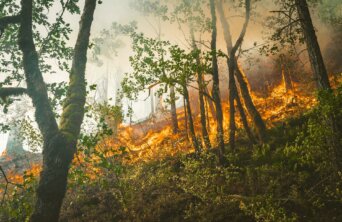- About
- Topics
- Picks
- Audio
- Story
- In-Depth
- Opinion
- News
- Donate
- Signup for our newsletterOur Editors' Best Picks.Send
Read, Debate: Engage.
| topic: | Climate Change |
|---|---|
| located: | Canada |
| editor: | Karan Anand |
As the climate crisis continues to escalate, citizens worldwide, especially young ones, are increasingly turning towards the legal system to hold governments accountable for their actions, or lack thereof. In Canada, climate-based litigations are on the rise, with 35 such cases being recorded since 2014.
Last week, however, was the first time a climate change lawsuit has reached trial among the dozens of cases which have been filed across the US and Canada in the last decade. In the Held vs Montana lawsuit, 16 plaintiffs aged 5 to 22 are suing the state for undermining their right to life by failing to take action against fossil fuel industries and global warming.
“That's my life, and my home is there and it impacts the well-being of myself, my family, my community," said 22-year-old Rikki Held, one of the plaintiffs, as she broke down in court last week. The hearings mark a significant moment in climate-based litigation, shedding light on the responsibility of governments to address the pressing causes of climate change, and its effects on their citizens.
The Montana lawsuit may be the first to reach trial, but there have been other cases too in which North Americans have sought intervention by the courts. Experts believe climate-based litigation, both against the state and corporations, will become even more common in the future as young peoples’ frustrations with the lack of action against global warming continue to grow.
In the 2019 case Mathur et al. vs. Her Majesty the Queen in Right of Ontario, seven young people sued the Ontario government for failing to protect future generations and violating their right to life, liberty and security, and right to equality. Although the case was dismissed without a trial, the judge agreed with the plaintiffs on some important points and observed that young and indigenous people are disproportionately impacted by climate change.
Driven by a sense of urgency, young plaintiffs hold the governments responsible for their role in exacerbating the climate crisis. They argue that inadequate climate policies and the failure to reduce greenhouse gas emissions by corporations directly infringe upon their constitutional rights. Young activists assert that the state has a fiduciary duty to protect the environment for future generations, urging governments to adopt immediate and substantial measures to reduce carbon emissions.
However, achieving success in climate-based litigation is challenging and requires innovative legal strategies. There are not many past judgements for the judges to refer to, which makes it even more difficult to convince them to rule against the state. Young activists often base their cases on constitutional rights, relying on the Canadian Charter of Rights and Freedoms.
To further bolster their cases, plaintiffs present scientific evidence linking climate change to government policies or negligence.
Furthermore, the public trust doctrine has emerged as a legal doctrine often used in climate litigations, which argues that the government holds natural resources in trust for the benefit of the public, making it the state's responsibility to safeguard these resources.
For the state, it needs to take immediate proactive measures to avoid more such litigations in the future. Investing in renewable energy sources, promoting energy efficiency, and supporting sustainable practices should be some of the first steps the government takes to demonstrate its commitment to climate action.
Additionally, engaging in open dialogue with young activists and environmental organisations is crucial. By creating platforms for meaningful participation by all, the state can ensure that diverse perspectives are considered when formulating climate policies.
Image by Karsten Winegeart

